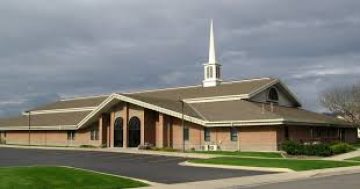By Jenny
“People just get too offended these days. That’s why they leave the church or go inactive. Your testimony is pretty weak if a little offense causes you to give everything up. If only inactives knew what they were losing.”
It was a Sunday in December 2014, and the Relief Society lesson was on a downward spiral. My tears were already flowing. I had struggled through Sunday school, knowing that people tolerated me but didn’t really care for my uncomfortable presence. I had just had an unpleasant conversation with the Relief Society President in which a simple request of mine to advertise a book exchange I was doing at my house was met with hostility. My book exchange was one last attempt to open myself up and connect with fellow ward members.
“I don’t know how anyone would choose the unhappiness of being outside of the church just because they were offended. I’ve been offended plenty and I’m sure I’ve offended other people too. You have to realize that people might not be perfect, but the church is perfect.”
I thought about my husband who hadn’t been to church in over a year and wasn’t exactly suffering at home. I couldn’t say the same for myself as I listened to this better-than-thou rant about inactive members of the church and how ignorant they are. I thought about my own feelings lately that it was time to walk away from my Mormon home. Usually at times like this I would open up my “church book,” This is My Doctrine, by Charles R. Harrell. That way I could immerse myself in deep critical examinations of Church Doctrine instead of letting my blood boil with rage because of the thoughtless commentary on people who can’t find belonging within the Mormon mold. But I was deeply saddened by the fact that my book had been missing for weeks and I couldn’t find it anywhere.
The word offense didn’t seem like quite the right word to describe what I had experienced in the last few years. Two years prior I had had a major breakthrough with a lot of questions I was trying to find answers to. I had a spiritual awakening that changed the core of my being. I was the same, but I was different. For the first time in a long time, I was actually fully engaged and excited about church, religion, and my faith community. I had discovered the feminine divine and felt a completeness where I didn’t even know there was a hole in my life. I had deeper love for people, a better understanding of struggles, and a huge desire for deep authentic connections with people.
I understood perfectly well how all of this would feel to people around me as I advocated for marginalized groups within the church such as women and the LGBT community. I had struggled for a very long time to come to the place I was at with everything. So I worked hard to find a balance at church. More than anything I wanted to continue to belong to the faith community that was my home. I knew the rules, I knew what I could and could not say, I knew how to fit in. But integrity also required that I put forth my authentic self. I saw examples of other people who were able to beautifully achieve this balance, and I hoped that I could as well.
But it didn’t take very long before I was being tattled on to the bishop for saying “Heavenly Parents” in primary. I was criticized and belittled by leaders, neighbors, people I thought were my friends. The day I was released from the primary presidency with public shame was the day that I lost any belongingness I had once had. I continued to sit through sacrament meetings by myself with four crazy kids long after my husband quit going. Every week was a series of increasing amounts of anxiety leading up to Sunday. Then I would plunge into despair every Sunday as I sobbed my way through church.
The winter of 2013 was a dark and depressing time for me. I could barely get out of bed, I cried constantly, had more frequent migraines, and became sick more often than I usually do. It might seem silly to experience so much psychological trauma over church. Brene Brown explains what I was experiencing beautifully in her book, “The Gifts of Imperfection.”
“We are biologically, cognitively, physically, and spiritually wired to love, to be loved, and to belong. When those needs are not met, we don’t function as we were meant to. We break. We fall apart. We numb. We ache. We hurt others. We get sick. There are certainly other causes of illness, numbing, and hurt, but the absence of love and belonging will always lead to suffering.” The Gifts of imperfection, by Brene Brown, Pg. 26
Now I sat trying to hide my tears, surrounded by other women, feeling very alone. I prayed silently for some sort of acknowledgement that I was valued and understood. I just needed to know that someone cared, really cared about me and what was important to me. At that moment I looked up through my tears and saw the book I had lost on the piano. I knew then that I was okay just as I was. I was valued and understood. My sense of belonging came from a source that can’t be confined within the walls of a church. Sure, I knew the rules to fit in at church, but I would not find belonging there, at least not at that time, in that place. So I made my grand exit from church, tears streaming down my face, only stopping to grab my book off the piano as I walked out.
“Belonging is the innate human desire to be part of something larger than us. Because this yearning is so primal, we often try to acquire it by fitting in and by seeking approval, which are not only hollow substitutes for belonging, but often barriers to it. Because true belonging only happens when we present our true selves to the world, our sense of belonging can never be greater than our level of self-acceptance.” The Gifts of Imperfection, by Brene Brown, Pg. 26
It’s been over a year now since I tried to find belonging in church. I am healthy, happy, and whole. Since that day I have found a belonging beyond anything I experienced by following the rules and trying to fit in. My belonging began with my own self-acceptance. When I let go of what other people would think of me, let go of the perfect Mormon girl that I was supposed to be, I was able to accept who I am and where my life has taken me. Not everyone will accept me as I am, and I’m okay with that. I can love them better as a whole and complete person who doesn’t need their approval.
Flash forward to this last Sunday. My ward has had a major overhaul, combining with three other wards. The leadership has completely changed. Over the last few weeks I have been asked many times whether I will come back to church now. On Sunday I went to church in my home ward for the first time in over a year. As I sat in the chapel on Sunday, curious about the changes, scrutinizing the new bishop, and wondering who the new Relief Society President would be, I fixed my mind on that question. Would I go back? No, definitely not back. I would go forward, whether that took me through the doors of church on Sunday or not.
Then the Relief Society President was called. As I looked across the aisle from where I sat, I was shocked to see a lady stand whom I know and love from another context besides church. She is in a yoga class that I teach, and part of community that I have worked to build over the year since I left my faith community. It was like the merging of two different worlds for me, one that had broken me with despair and heartache, and another that had healed me. I still don’t know what to make of it, but when I saw her stand, I felt a sense of belonging that I attribute to the same source that spoke to me when I saw my book on the piano. Someone understands and values me, and knows how to speak to my heart to tell me I belong.
Will I go to church again? Will I put effort into being part of this new community? I don’t know. Can I be my authentic self without being the target of hostility? Can I love my LGBT sisters and brothers and expect more from the church for them without being called a servant of Satan? Can I advocate for more equality for women and work with leaders to promote change without being belittled and publicly shamed? Will my presence at church help someone else to feel a greater sense of belonging? It’s a tall order, but I know that my mental health requires that I find belonging as I am without playing games to fit in. These are all questions I’m taking with me as I move forward in my quest to create space for more belonging in the church and in the world. For now, maybe I’ll take a cautious step forward, armed with a potluck dish for the meet and greet this Sunday. Maybe.






14 Responses
Oh Jenny, I am so glad to hear that things are changing in your local ward! I hope for the sake of all the vulnerable people in your area that these changes lead to a healthier spiritual community there. But I want you to know that I deeply value our friendship and will not condition it on whether you become more or less active in the church.
Jenny, you are such a treasure. I hope the new members and leadership of your ward have their eyes open to see that about you! And I wish I had been your visiting teacher and given you all the airtime, shoulders and casseroles your heart could hold.
Whether or not you attend church in the future after the sting of your previous rejections has healed over, you will always have a heart that knows how to mourn with others in the same circumstances. Our wards and communities need that. If we leave, who will be left to mourn with anyone else?
Different life. Different country. But a similar story and similar journey. Thank-you so much for sharing. It really helps me to not feel so alone.
This is gorgeous, Jenny, and leaves me with so much hope. I hope that your ward is a welcoming place, for their sake as much as yours. More than anything, though, I hope that you continue to feel whole and happy!
This gives me hope that maybe, one day, if I want to, I could find a space of belonging within my LDS ward.
I think you’ve told the story of a thousand women . . . or ten thousand. You have a beautiful voice. I especially loved how you found your soul opening up with your awareness of feminine deity. How can anyone remain unchanged after one’s mind and heart find a God who looks like them? I’m so glad you wrote this. I’m so glad to know you. Blessings to you and yours, Jenny.
Jenny, I love your guts. Not only do I love the transformation of the toxic ward around you (can I call it a tender mercy???)…..but my favorite line from this whole piece: “Would I go back? No, definitely not back. I would go forward”. Wow. What a declarative truth that only comes from knowing oneself. I love it, and I’m stealing it.
“Would I go back? No, definitely not back. I would go forward, whether that took me through the doors of church on Sunday or not.”
Thank you for this. It just helped me shift some questions I’ve been asking myself.
This took me back a few years, to a similar discussion in a similar Relief Society room–and all those same feelings I felt as I decided I just couldn’t anymore. Thanks for telling our story–yours, mine, and dozens of other women’s, too. Blessings to you–to all of us–as we look for our paths forward.
What was wrong with you using the term “Heavenly Parents” in primary? It’s not typical, but it definitely is not against our doctrine to teach that we have a Heavenly Father and Heavenly Mother. Sorry I’m just curious. I’ve just been called to Young Women’s, and I would like to incorporate the term “Heavenly Parents” more into lessons. I didn’t realize this could be something you would be released for.
I think it caught people’s attention because it isn’t something we normally say. The bishop met with me about it and I explained why I say it that way and why gender inclusive language is important to me. Then he went to the Stake President and the Stake President told him I could only say Heavenly Father. I told the bishop that I couldn’t do that so he would have to either release me or I could talk to the Stake President myself. During a grueling two and a half hour meeting with the Stake President I used the BYU Studies article to show him that we don’t need to be silent about Heavenly Mother. I think he felt a little backed into a corner by that, so he kept saying that he thought I was only using Heavenly Mother to push buttons and create drama at church. Then he interrogated me about all my other views on women and the church and belittled me to no end. I finally walked out and I’m pretty sure that’s when he turned my bishop completely against me. I don’t think that is a normal reaction at all. I know other people who say Heavenly Parents and have no problems. Young womens is such an important place to use gender inclusive language, especially about God. I hope it goes well for you. I have decided for myself that the healthy development of young girls and their identities is more important to me than saying what is culturally appropriate.
Wow. I’m so sorry. That sounds terrible. I think it’s so funny as a church that we talk about being wary of false traditions when we perpetuate some ridiculous false traditions of our own. If the apostles can say Heavenly Parents in General Conference, there is no reason for members to avoid the term. How absurd and hurtful. I hope you know how much God loves you and cares about your experiences and struggles.
This is beautiful, Jenny. (Your Winter of 2013 sounds a lot like my Winter of 2016) I love you and I’m so glad you’re a part of this community.
Hi Jenny, I love your words, you validated much of what I am feeling right now in my life. I’m curious to what kind of yoga you do/teach?